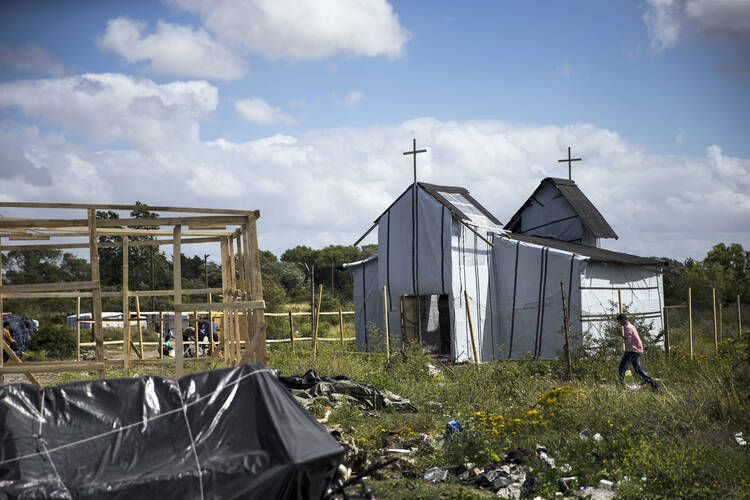As new dimensions and the widening scale of the European refugee catastrophe emerge, a deeper significance has begun to surface, beyond the scope of our imagination until very recently. The more we are learning about this movement of people across at least one continent, the more we understand its deeper realities. And these realities are polarizing commentary and opinion here in Britain, even as they heighten differences in attitudes between here and elsewhere.
We might not have realized this until a BBC made an editorial decision to film a religious program ("Songs of Praise," available in the UK only) in the Calais migrant camp, where several thousand people, travellers from countries such as Syria, Libya and Eritrea, have gathered in the camp known as the “Calais Jungle,” hoping to make it to Britain. The controversy that the making of this program caused, in some sections of British media and society at least, served to reveal the deep faith of many of the migrants. It served to remind that the people knocking on our door are real human beings, with faith, hope and fears, far from evil would-be invaders threatening our country and our culture. It is no longer so easy to deny that some of these itinerants are fleeing religious persecution in their countries of origin. To the horror of certain observers, the Calais migrants emerge as actual real people, some of whom even go to church.
What caught many people by surprise is news footage showing that some of the migrants in the Calais camp have constructed a chapel. Ethiopian and Eritrean worshippers have built St. Michael’s Church out of whatever materials came to hand. Nearby, there is an equally makeshift mosque, built also by refugees themselves. The UK national broadcaster, BBC, has been filming in St. Michael’s for a recently-broadcast episode of “Songs of Praise,” said to be the longest-running religious TV program in the world. The camp’s church is the third such improvised Christian structure; the first lasted until the camp was moved while the second was burnt down after a candle got dropped. The realization that some of these people, like some of us here, are Christians who take their faith seriously has defied their demonization in some sections of our media and our government.
One UK daily, in a spittle-specked fury of indignation, demanded to know why taxpayers’ money was being wasted in this way (the BBC carries no advertising domestically, but gets its money from a government-imposed tax known popularly as the “TV Licence”). Another, the Murdoch-owned Sun, raging about “Hymnigrants” [sic], likened the BBC’s decision to “something from Monty Python.” Responding, the BBC’s Head of religion and ethics, Aaqil Ahmed, blogged “The knowledge that the migrants had built a makeshift church is exactly the kind of action that Christian communities everywhere will relate to.” He denied making any political statement or judgement on migration.
UK Prime Minister Cameron had refused to compromise on his much-criticized “swarms” description of the refugees. His cabinet colleague, the normally unspectacular Foreign Secretary Philip Hammond, led a line-up of Tory MPs in condemning the program. He chose even stronger language than Cameron had employed. On his view, “millions of marauding African migrants pose a threat to the EU’s standard of living and social structure” while maintaining the Tory Government’s line that these are economic migrants, not refugees escaping persecution. Government statements, so far, refused to acknowledge that several other EU states have accepted many more refugees than Britain—and made them welcome.
Europe’s troubles continue to deepen each day. The migrant emergency on its southern shores gets worse with no solution in sight as fresh news of human suffering horrifies the continent. The latest developments include yet more capsizes of catastrophically over-filled vessels and emerging news of chaotic scenes on three Greek islands, wholly incapable of receiving refugees yet faced with record numbers of arrivals. It is only now emerging that large numbers of people are arriving, not only in Greece but also in Bulgaria and Hungary, countries whose resources are already thin. What we are seeing is a humanitarian disaster on a much larger scale than previously thought, of which the Calais standoff is numerically only one small part. In the pictures and stories from the Calais church, we saw and heard real people and we were reminded of the real human tragedy extending from our continent’s southern to northern shores. Real people, fleeing from real persecution, real danger. This is our 21st century Exodus.
David Stewart, S.J., is America's London correspondent.








